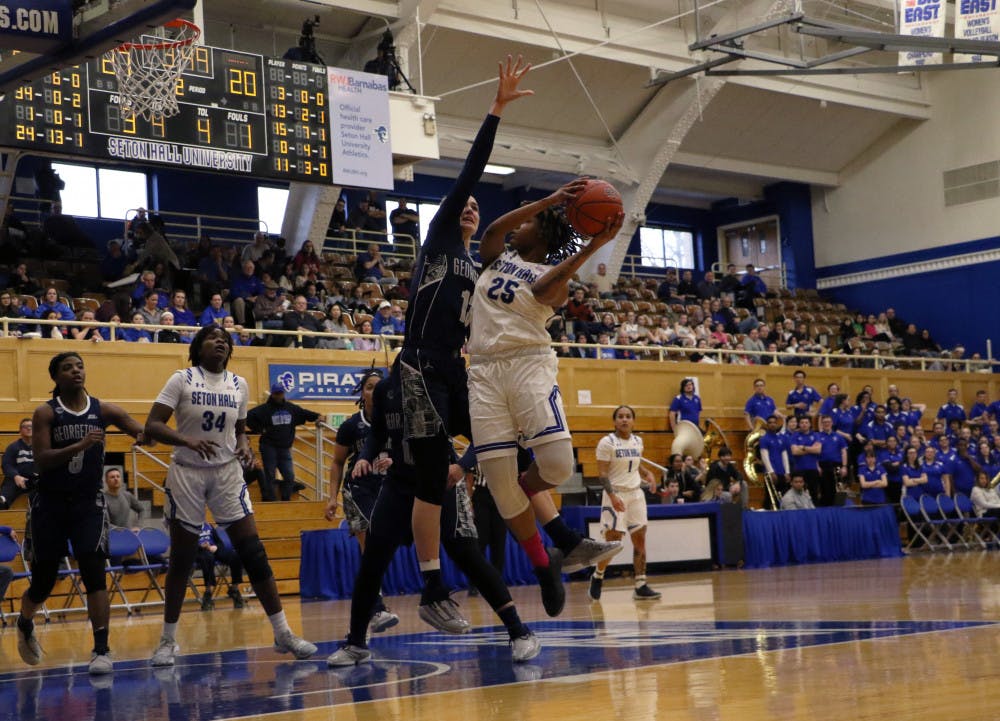For students eager to protect themselves against the H1N1 virus, the first batch of vaccines will be distributed 0ct. 21 to select groups.
Seton Hall has ordered 6,000 doses of the vaccine, based on estimates of how many people on campus would receive the vaccine.
The first batch, however, received on Oct. 13, was only for 600 doses in the form of nasal spray form.
The university is not in control over how many doses are sent in each shipment or how quickly they will arrive, Karen Van Norman, associate vice president and dean of students, said.
While Seton Hall only received a fraction of the total order, students will still be receiving the vaccine.
The first group of students to receive the vaccine will be students who are assigned to clinical locations, such as nursing students, and some of the athletes, according to Van Norman.
"The reason that athletic teams were elevated to priority status is again, in keeping with best practices, we recognize that they can be more at risk due to their travel, close proximity to one another, etc.," Van Norman said in an e-mail interview. "As soon as we get more vaccines, which can be any day, we will have additional clinics and get more students vaccinated."
While the seasonal flu vaccine cost students $30, the H1N1 vaccine will be free of charge on campus for all students.
The next batches of the vaccine are expected to be in the injectable form, according to Van Norman, but the university will not be sure until those orders are received.
According to the Centers for Disease Control and Prevention, there are two kinds of H1N1 vaccines being produced: the traditional "flu shot" injectable form and the nasal spray flu vaccine.
The nasal spray H1N1 flu vaccine is a vaccine made with live, weakened viruses that do not cause the flu. The H1N1 "flu shot" is an inactivated vaccine that is given with a needle.
The next batches of vaccinations will be distributed in priority order, as recommended by the CDC and from the best practices from other institutions, according to Van Norman.
Van Norman provided an example: students have a higher priority order due to their age because the vaccine is strongly recommended for those under the age of 24.
"We don't know when we will have enough vaccine to start reaching out to larger numbers of students, but we do expect that it will be in the next few weeks," Van Norman said. "Our next group to target will be resident students."
Resident students would be next to receive the vaccine because, according to Van Norman and best practice advice, they are at higher risk than commuters.
"My hope is that everyone who wants a vaccine will have it by Thanksgiving," Van Norman said. "Please understand that I base that on what I'm hearing and learning in news reports; we have no further information from the local or state health department at this time."
However, while there is not a "guarantee" on when the university will receive the vaccinations, Van Norman said, "Recent news reports from the CDC indicate that there will be sufficient quantity for anyone who wants to receive the vaccine to be able to do so."
According to information from Health Services, people should receive the H1N1 nasal spray vaccine if they are between ages two and 24 years, or between ages 25 and 49 years and live with or care for infants less than six months of age or are a health care or emergency medical personnel.
Health Services said those who are pregnant, have asthma or any long-term health problems, have a severe (life-threatening) allergy to eggs, prior flu vaccines, or substances in the vaccine, or have Guillain-Barre Syndromeshould not receive the H1N1 nasal spray vaccine.
Individuals who have received the seasonal flu vaccine are not protected from the H1N1 virus.
In addition, it is not necessary to have received the seasonal flu vaccine in order to receive the H1N1 vaccine.
Junior Peter Chacanias, an English major, is planning to receive the H1N1 vaccine on campus when it is offered, especially since it will be free on campus.
"That's not something someone should have to pay for," Chacanias said of the vaccine. "It's for the health of the students, not the benefit of the school."
However, he did not agree with athletes being offered the first round of vaccinations.
"Nursing students, I think, is understandable (to receive the vaccine first) because they are doing clinicals," Chacanias said. "But athletes I think it's unfair and biased. I realize that they travel but that doesn't seem like a big deal. People commute from home. They travel."
Chacanias is hoping that when he goes to receive the vaccine, they are offering the injectable form because it is the only one he will consider.
For students who are hesitant to receive the H1N1 vaccine, Van Norman said, "it is much safer to get the vaccine than to get the flu. We strongly encourage all students to get the vaccine."
Brittany Biesiada can be reached at brittany.biesiada@student.shu.edu.





